In memoriam John Steinig

We are deeply saddened to learn that Prof. John Steinig passed away on 25 March 2023, at the age of 82. We are very grateful for his many contributions to our community for over 40 years.
The Section extends its condolences to his family, students, and colleagues.
John Steinig was born in Boston on 21 August 1940, and spent part of his childhood in Bombay. He studied at the Swiss Federal Institute of Technology in Zürich, where he defended his thesis in 1968 under the supervision of K.S. Chandrasekharan, entitled "The changes of sign of certain arithmetical error terms". He was appointed assistant professor at the University of Illinois at Urbana-Champaign (UIUC) in 1968 and at the University of Geneva in 1971. In 1974 he was appointed associate professor (UIUC), and in 1975 extraordinary professor (Geneva). In 1978 he was appointed full professor at the University of Geneva, where he taught until 2005. He was President of the Mathematics Section twice, from 1978 to 1981, and from 1988 to 1991.
His main field of activity and teaching is number theory, elementary, analytical and combinatorial. In particular, he established in 1970, in collaboration with Harold Diamond, the first estimate of the remainder in the prime number theorem that is both of an order comparable to the classical La Vallée Poussin evaluation, and that can be obtained by an elementary method that does not make use of any of the properties of the Riemann zeta function. His other works are mainly concerned with elementary geometry, inequalities, sign problems, and monotonicity relations. He was an outstanding writer and his articles are of great clarity.
In the Mathematics Section, he taught graduate courses in number theory (introduction to number theory; analytical number theory; Diophantine approximations; continued fractions; additive number theory; combinatorial number theory).
He continued his editorial activity long after his retirement as a member of the editorial staff of "L'Enseignement Mathématique".
He also maintained a close collaboration with the teaching of mathematics in schools, on the one hand by giving courses and seminars for teachers or future teachers in secondary schools, and on the other hand by rewriting himself some of the mathematics textbooks used in the Cycle d'orientation.
His old friend and colleague Harold Diamond describes him
"as having the manner and tastes of an elegant European from a hundred years ago. His English was perfect, but it was so lacking in slang and idle filler words that a close observer could tell that he did not grow up speaking it with other children."
and recalls that he had a very particular and elaborate sense of humour, as he illustrates with this anecdote.
« John had good judgment about how much to say and a droll sense of humor. Many years ago, participants at a conference in France were invited to tour a sea-food (let’s say oyster) farm, which included a description of the operation, followed by a meal. The proprietor (P) droned on in French about various aspects of the business, and John was to render it into English. P gave an account of sea-food farming, far longer than anyone wanted to hear, and John said “Oysters live in the ocean.” Then P detailed a litany of complaints about governmental policies toward the farmers, and John said something like, “Farmers have a hard time with the government.” P turned to John and asked whether he was leaving things out of his translations, and John replied, in French of course, that English was a very concise language. »
31 Mar 2023
